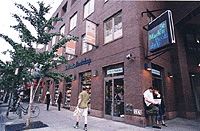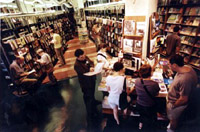- Categories:
East Village Iconoclast Celebrates Healthy Middle Age
 Counterculture pioneers of Manhattan's East Village in the 1960s and '70s warned young people not to trust anyone over 30. If that admonition applies to bookstores, the illustrious St. Mark's Bookshop, now located on Third Avenue between 8th and 9th Streets, may soon attract wary glances from youthful customers. On November 13, the store, located in 2,700 square feet on the ground floor of a Cooper Union college dormitory, celebrates three decades of purveying reading materials to neighborhood intellectuals, students, professors, aesthetes, and tourists.
Counterculture pioneers of Manhattan's East Village in the 1960s and '70s warned young people not to trust anyone over 30. If that admonition applies to bookstores, the illustrious St. Mark's Bookshop, now located on Third Avenue between 8th and 9th Streets, may soon attract wary glances from youthful customers. On November 13, the store, located in 2,700 square feet on the ground floor of a Cooper Union college dormitory, celebrates three decades of purveying reading materials to neighborhood intellectuals, students, professors, aesthetes, and tourists.
St. Mark's will observe the anniversary by giving away a $30 gift certificate every 30 minutes all day on the 13th. All day, noted co-owner Bob Contant, means 10:00 a.m. to midnight, hours that the store maintains every day but Sunday (when it opens at 11:00 a.m.). The denizens of the bookstore's East Village neighborhood are known for keeping very late hours, and "we'd certainly get business if we stayed open later," added Contant.
 St. Mark's inventory of arcane philosophy and cultural theory, non-commercial literature, esoteric poetry, sophisticated design books, avant-garde chapbooks, and almost 2,000 periodicals, has always drawn people to the store despite drastic fluctuations in the surrounding neighborhood: deterioration then gentrification; loss of tourist revenue after the terrorist attacks of 9/11; influxes of affluent college students from Cooper Union (for the Advancement of Science and Art), New York University, and New School University; and Japanese nationals who have flocked to the area now part of a region called "Little Japan."
St. Mark's inventory of arcane philosophy and cultural theory, non-commercial literature, esoteric poetry, sophisticated design books, avant-garde chapbooks, and almost 2,000 periodicals, has always drawn people to the store despite drastic fluctuations in the surrounding neighborhood: deterioration then gentrification; loss of tourist revenue after the terrorist attacks of 9/11; influxes of affluent college students from Cooper Union (for the Advancement of Science and Art), New York University, and New School University; and Japanese nationals who have flocked to the area now part of a region called "Little Japan."
Contant described the neighborhood as a longtime mecca for people with "artistic and cultural ambitions, and the venues that support them." He referred to the theaters and galleries that now attract visitors from around the metropolitan area and around the world.
When Contant, co-owner Terence McCoy, and three other founding partners who are no longer involved with the store, began St. Mark's, "people who worked here could actually afford to live here," said Contant. Although members of the community then were not "particularly materialistic," he said, "books were cheap and everyone bought them."
The current crop of neighborhood residents, including those who have gentrified the once drug-infested, abandoned buildings of 30 and 40 years ago, and affluent college students who "spend their money on nice restaurants and clothes," are not patronizing the store consistently, Contant observed. "It is a struggle -- business is currently flat." But, he added, the store has just renewed its 10-year lease.
 |
|
Photo credit: Zivkovic Associates Architects, NYC
|
One unexpected development that likely will impact sales at St. Mark's is the closing of the Astor Place Barnes & Noble, a 32,000-square-foot chain store two blocks away, on December 31, after 13 years at that location. In a recent New York Times' article about the closing, Contant was quoted equating Barnes & Noble to a mass-culture-oriented supermarket and St. Mark's to a gourmet food store. "It's a different clientele; it's a different market. We hope that someone who needs a quart of milk will come to us to buy it," he said. But, Contant told BTW, "The [B&N] closing is definitely not going to hurt us."
St. Mark's has been a strong supporter and member of Book Sense, "since the day it started," he said. Part of the appeal is that, like Book Sense, St. Mark's focuses on midlist titles, which are often neglected by the large retailers and don't fly off the shelves like new, mass market titles.
The store does carry some commercially successful titles, including Harry Potter & the Deathly Hallows (Scholastic). "We sold about 50 of them that Friday night. We're open at midnight anyway," Contant said. More characteristic of the store, however, is the midnight release party it held for Against the Day (Penguin), the latest novel by enigmatic author Thomas Pynchon.
Sometimes a new book, considered literary and non-commercial, therefore legitimate by the store's iconoclastic clientele and staff, becomes a national bestseller -- such as Cormac McCarthy's, The Road (Vintage). "In that case," Contant said with a laugh, "we feel like we've been co-opted." --Nomi Schwartz

